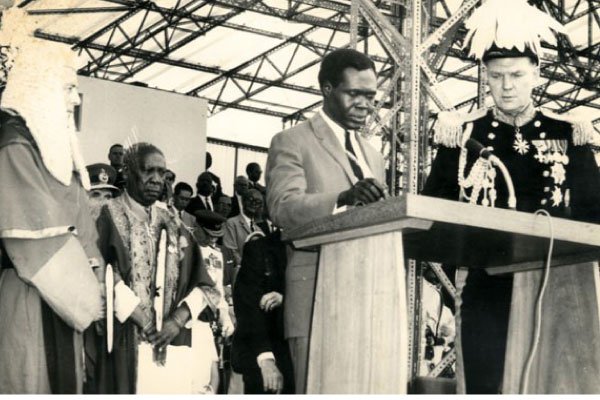Kampala- Fifty-six years ago, today, Uganda’s first executive prime minister Milton Obote set four-fold priorities for an independent Uganda: political stability, safeguarding the economy, improving social services and building an efficient civil service.
“There is a place in Uganda for all who have her interests at heart, whatever their tribe, race or creed. Let all of us, who wish to see Uganda prosper, join together in resolving to build a great and united nation,” he said while receiving the instruments of power from departing British colonialists.
That was at Kololo ceremonial grounds in Kampala on the night of October 9, 1962.
This morning, and about 180 kilometres away in Kyotera District, President Museveni will, for the 33rd time, ascend the rostrum to speak to Ugandans as they observe the 56th anniversary of independence.
If the country had been an average Ugandan citizen, it would have risen and fallen through the undulations of childhood and adolescence, made plentiful mistakes, endured the goads of formal education, scaled the travails of job search and plunged in the comfort of its perks while closing in on retirement at 60 years.
Perhaps more importantly, it would be seven years shy of dying if the Uganda Bureau of Statistics-calculated life expectancy of 63 years were to apply.
So, what is the report card on feats and failures of 56-year-old Uganda ensnared in the battle between autonomy and dependence?
Wealth and debt
The World Bank in a 1993 report described Uganda’s economy at independence as one of the most promising in sub-Saharan Africa.
The country was self-sufficient in food, export of coffee, cotton and cocoa brought in plentiful foreign exchange, a vibrant local manufacturing sector supplied basic inputs and consumer goods. Copper and cobalt exports added to the riches, providing a positive balance of trade.
Fiscal and monetary management was sound, and the domestic savings rate averaged about 15 per cent of the about $6m (about Shs21.6b) Gross Domestic Product.
The GDP had ballooned to $25.89b in 2017, according to World Bank. However, Oxfam has warned that widespread income inequality and concentration of riches in the hands of politically well-connected individuals places the country on a self-destruct path.
Worse, the debt has piled to $10b (Shs41 trillion), according to the latest Finance ministry figures, even after Uganda benefitted debt relief in four cycles between 1998 and 2005.
Debt undermines sovereignity, according to Uganda Debt Network, and diminishes the power and influence of independent states against creditors besides chippings away future wealth.
Balance of payment position
One measure of a country’s actual wealth is a comparison of its earnings from exports and expenditure on imports. An independent Uganda depends more than it did 56 years ago on foreign manufactured goods.
These include basics such as needles and China-made tooth picks to grand machinery, electronics, automobiles and wines and spirits.
As a result, the country’s Balance of Payments position is in the red; with $348.5m trade deficit of as of August 2018.
Education
The 7-6-3 primary, secondary and university education model in force is a colonial inheritance. Little has changed in the curriculum, even when the needs of an independent Uganda have rapidly evolved.
Teaching is rarely aligned to generate knowledge and skills critical to place Uganda on a pedestal to achieve development goals enunciated in national medium and long-term blueprints.
Increased enrollment in primary schools from a few thousands to millions has been undercut by quality deficits where passage through classes is, under the universal education programme, more a ritual than scholarly exercise.
Ugandans, who can afford or are gifted to snap up foreign government-offered scholarships, feel more fulfilled to study in the West, including in Britain.
A diminished education sector is yielding mass educated and unemployable youth.
Geo-political card play
In theory, independence meant Uganda would make all key decisions. In practice, it never did. The immediate post-independence governments battled with the allures of capitalism and communism, prompting President Milton Obote’s 1969 move to the Left, a marginal shift to socialism, policy proclamation.
President Museveni, an intellectual socialist, on capturing power embraced a free-market economy, including the Bretton Woods institutions-dictated 1980s Structural Adjustment Programmes. This made him a darling to the West that viewed him favourably as a reformist leader.
A closer scrutiny injured the economic and diplomatic relations, prompting Mr Museveni to turn to China, which funds most of Uganda’s big-ticket infrastructure road and energy projects costing billions of dollars, for economic and political benefaction.
Dependence versus autonomy
From towering external debt burden to cash hand-outs by the President, both Uganda and its citizens suffer one ignominy: elusive self-reliance.
It is one country where a President can carry money in a sack or car boot to hand out to eager recipients mostly identifying themselves as regime lackeys or credit and saving schemes, many founded overnight to tap into a presidential largesse.
That tokenism extends to the administrative reconfiguration. Whereas Uganda had 16 districts at independence, it has today been balkanised into 125 districts, with more lined up for operationalisation at the start of subsequent financial years.
This in theory is a success score of decentralisation; taking services closer to the people.
However, insufficient local revenue has meant the districts rely almost entirely on the central government to finance development projects and recurrent expenditure, turning them into captive political constituencies with additional dividends of gerrymandering.
BLACK COLONISERS
Independence did not significantly re-order the power relations between the leaders and the led.
The presidency remained imperial under the constitution.
Its trappings armed the office holder to patronise both Parliament and Judiciary, the other two arms of government created in law to exercise checks and balances.
From perks to power, the only visible difference between a colonised and independent Uganda, according to critics, is that black citizens substituted the British.
By Daily Monitor



